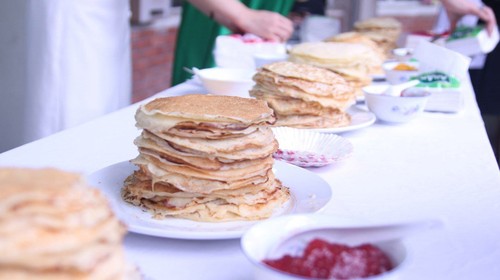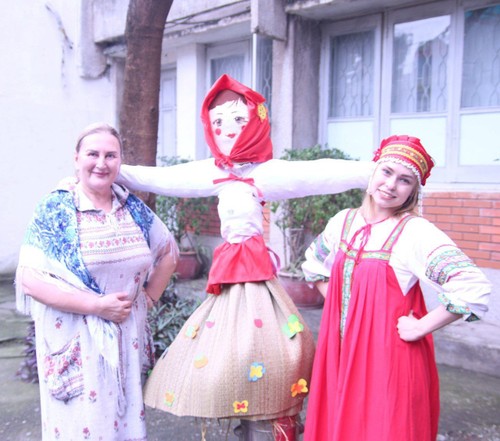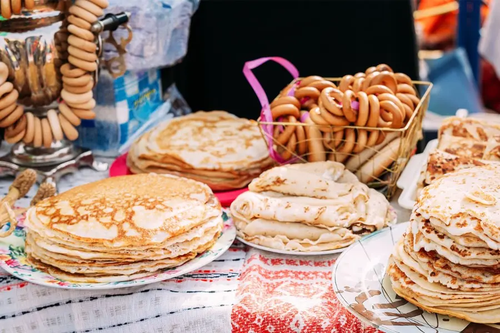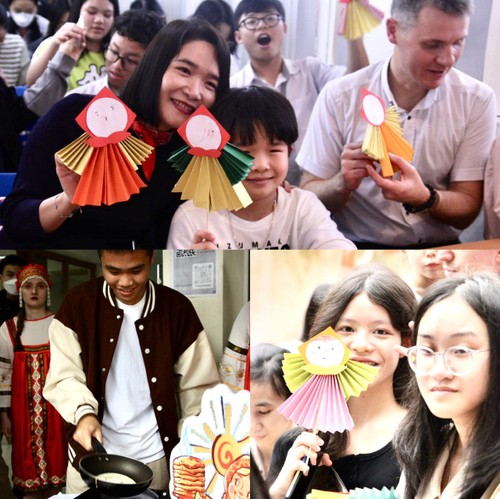 Blinui-thin pancakes- is the heart and soul of the festival. (Photo: HBPSRLI) Blinui-thin pancakes- is the heart and soul of the festival. (Photo: HBPSRLI) |
Also known as the Sun Festival, the Pancake, and Butter Week, this festival celebrates the end of cold and the beginning of warmth, hope, and growth.
In Slavic mythology, Maslenitsa is a sun festival, personified by the ancient god Volos, and a celebration of the imminent end of winter. In the Christian tradition, Maslenitsa is the last week before the Great Lent, and the last opportunity to eat your fill before the period of fasting and abstinence that leads up to Easter.
If in the old days Maslenitsa was for remembering the dead by burning a figure of Maslenitsa, today the Russians have turned a sad holiday into a jolly Maslenitsa.
Kornienko Natalia, a project manager at the Russian Center for Culture and Science in Hanoi, said that the main traditional activities of Russian people during this holiday are sledding down a hill, cooking traditional pancakes, singing folk songs, having a snowfight, horse riding and playing other fighting games. People also visit their friends and relatives.
“Russian people believe that noise and excitement during the holiday awakens the spring and brings a good summer harvest,” said Natalia.
 The straw effigy of “Lady Maslenitsa” is burned at the end of the Maslenitsa festival. Her bag was full of written wishes, which people believed will come true if burned with the lady. (Photo: HBPSRLI) The straw effigy of “Lady Maslenitsa” is burned at the end of the Maslenitsa festival. Her bag was full of written wishes, which people believed will come true if burned with the lady. (Photo: HBPSRLI)
|
Elena Bezdetko, wife of the Russian Ambassador to Vietnam, said Maslenitsa lasts a week.
“The traditional holiday is popular and widely celebrated, both in Western Russia and in other parts of Russia, even in Siberia, in all regions, cities, in Buryatia. The holiday is marked everywhere,” said Ms Bezdetko.
The rituals of Maslenitsa are a combination of end of winter rituals, opening of spring festivals, and ceremonies to promote a rich harvest, says Ms. Bezdetko, adding that although Russians are Christians, Maslenitsa has been harmoniously integrated into Orthodox culture.
“Maslenitsa week ends with ‘Forgiveness Sunday’, when everyone, whether Orthodox or Christian, asks others to forgive the wrongs done to them. On Forgiveness Sunday people say: ‘Please forgive my mistakes, whether unintentional or intentional’. And the other responds: ‘I forgive’ or ‘God will forgive, and so will I’. This is the answer everyone gives during Maslenitsa,” Ms. Bezdetko explained.
 It's said that Maslenitsa festival in Russia is when the pancakes never end. (Photo: HBPSRLI) It's said that Maslenitsa festival in Russia is when the pancakes never end. (Photo: HBPSRLI) |
Another interesting part of the tradition is making blinui – thin pancakes or crepes.
In recent years, during the holiday, people often make gato blinui, which can have sweet or savory fillings of mushrooms, meat, vegetables, and cabbage, said Natalia.
“The pancake is the traditional Maslenitsa food because it symbolizes the sun. It’s different from American pancakes because Russians tend to make them thinner and they eat pancakes with different kinds of jam, heavy cream, honey, or clotted cheese,” according to Natalia.
Russians have a variety of cakes – all kinds of donuts and bagels to enjoy with tea – for Maslenitsa and all other holidays. And Russians are known to eat as many blinui as possible during Maslenitsa, since the seven days of Maslenitsa are followed by the seven somber weeks of Great Lent.
 Various activities were held during this year’s Maslenitsa Festival in Hanoi. (Photo: HBPSRLI) Various activities were held during this year’s Maslenitsa Festival in Hanoi. (Photo: HBPSRLI)
|
The festival lasts from Monday to Sunday and is divided into two parts. From Monday to Wednesday is the first half, and the second half is the great festival.
Each day of the festive week has its own name and meaning.
Monday, for example, is to welcome ‘Lady Maslenitsa’ who represents winter. The community builds a Maslenitsa effigy out of straw, decorated with rags and fixed to a pole that is paraded around. The first pancakes are made and offered to the poor.
On Tuesday, called "Meeting", young men search for a fiancée to marry after Lent.
“On Wednesday, the mother-in-law must invite her son-in-law to treat him to handmade pancakes to show her sympathies,” said Natalia.
“But nowadays very few people know of this custom and follow it. But most traditions survive and are still familiar to the younger generation in Russia,” she noted.
Thursday, "Open day", is devoted to outdoor activities. People take time off work and spend the day sledding, ice skating, having snowball fights, and going on sleigh rides, according to Ms. Bezdetko.
The three main holidays are Friday, when sons-in-law invite their mothers-in-law for dinner; Saturday, a time for young wives to get to know their sisters-in-law better; and Sunday, the most important day.
“As I said, it’s called ‘Shrove Sunday’ or ‘Forgiveness Sunday’, when everyone asks others for forgiveness. Then the 40-day Great Lent begins. And that’s how a pagan holiday merged with Orthodoxy. Everything exists peacefully and harmoniously. There’s eating, drinking, and making merry, and then the fasting begins. The Orthodox will live days of frugality and humility until Easter,” said Ms. Bezdetko.
The Maslenitsa Festival has been held in Vietnam a number of times to introduce the Russian culture to the Vietnamese.
Nguyen Thi Thu Dat, Director of the Hanoi branch of the Pushkin Institute of the Russian Language, said that the Puskin Institute in Vietnam always tries to organize big Russian holidays for everyone who loves Russia and its culture.
“We’ve organized the Maslenitsa festival several times. This year isn’t the first time. But I’m happy to say that each year the number of people registering to participate is on the rise. This year, for example, 200 students from 10 schools and universities registered, and many who don't even know Russian," said Dat.
Maslenitsa ends with the first day of Lent – Clean Monday – which is considered a day of fasting and purification from sin . On Clean Monday people usually take a bath and women wash all the dishes.